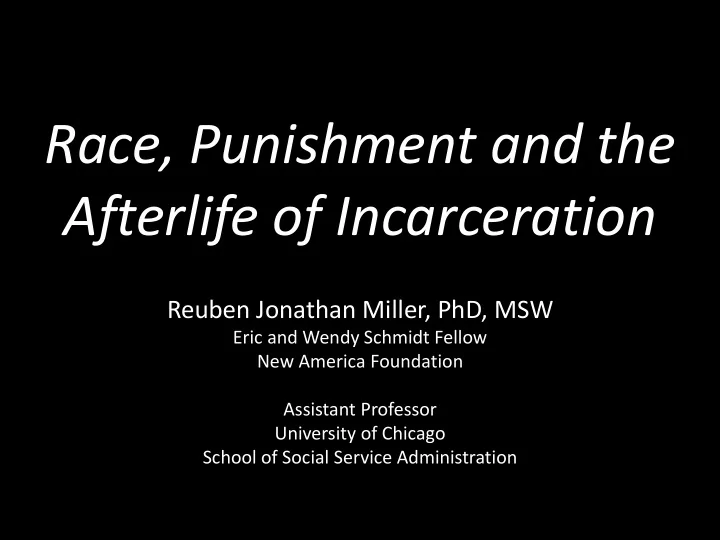

Race, Punishment and the Afterlife of Incarceration Reuben Jonathan Miller, PhD, MSW Eric and Wendy Schmidt Fellow New America Foundation Assistant Professor University of Chicago School of Social Service Administration
An open letter to Angela Davis “…And so, Newsweek , civilized defender of the indefensible… puts you on its cover, chained.”
Ask any Mexican, any Puerto Rican, any black man, any poor person …if one really wishes to know how justice is administered in a country, one does not question the policemen… …ask the wretched how they fare in the halls of justice, and then you will know…
A matter of citizenship
Racial Difference • “Contrary to popular belief, Africans did not sell their brothers and sisters into slavery. They sold strangers… • …In order to betray your race, you had to first imagine yourself as one.”
Making race (and racist ideas)
Making whiteness
Racial Innocence
Making Black Criminality Or, the construction of black guilt
The Stats for Black Americans • Twice as likely to be arrested • 5 times more likely to be incarcerated • 60% of high school drop outs will do time • 30% of high school graduates will do time
Mass Incarceration and Population Health • HIV prevalence in prison 5x’s higher • Hepatitis C prevalence 9 times higher • Between 12 and 35% of all individuals with communicable diseases passed through a prison • The population is rapidly aging • Negative mental health outcomes – Prisoners, their partners children and community members
A question of Legitimacy • Stop and Frisk – Black and Latino Americans stopped despite evidence – Found unconstitutional • Exonerations – Over 2,000 since 1989 – Spent 9 years in prison on average – 2/3 were black or Latino
A matter of citizenship • 40 million police stops each year • “The police are our government.” • Soss and Weaver 2018
Carceral Citizenship • Unique Restrictions – 48,000 laws, policies and sanctions – Conditions of release (laws on top of laws) • Unique Rights – Risk scores and services – Counseling and housing when convicted of abuse or neglect • Unique Responsibilities – Giving back – Need to convince others of your moral worth – Engagement in care work • A different experience of American Democracy
Putting the prison in context 2,500,000 2,000,000 1,500,000 1,000,000 500,000 0 Currently Incarcerated
Prison vs. the carceral continuum 4,000,000 3,500,000 3,000,000 2,500,000 2,000,000 1,500,000 1,000,000 500,000 0 Currently Incarcerated Probation and parole
Prison vs. the carceral continuum 14,000,000 12,000,000 10,000,000 8,000,000 6,000,000 4,000,000 2,000,000 0 Currently Incarcerated Probation and parole Jail, Detention and Lockup Facilities
Prison vs. the carceral continuum 20,000,000 18,000,000 16,000,000 14,000,000 12,000,000 10,000,000 8,000,000 6,000,000 4,000,000 2,000,000 0 Currently Incarcerated Probation and parole Jail, Detention and Felony Convictions Lockup Facilities
Prison vs. the carceral continuum 70,000,000 60,000,000 50,000,000 40,000,000 30,000,000 20,000,000 10,000,000 0 Currently Probation and Jail, Detention and Felony Convictions Criminal Records Incarcerated parole Lockup Facilities
Criminal punishment’s multiple sites and actors Population under carceral control (in millions) Criminal Records Third Parties, Govt Officials, Families and Friends Jails, DCs and Police Station Lockups Police, Courts, Guards, Staff Probation and Parole POs and CORs Prisons Guards and Correctional Staff 0 10 20 30 40 50 60 70 80
Community is Where the Action Is Mass Incarceration or Mass Supervision? 80 70 60 50 40 30 20 10 0 Mass Incarceration (U.S. Jail and Prison Population) Mass Supervision (Other Identified Forms of Penal Supervision)
The prison: Just one part of a vast carceral network Prison vs. the Carceral Continuum Prison and Jail 3% Population All others affected by Carceral Expansion 97%
National Inventory of Collateral Consequences of Conviction
All of them • 1,523 unique laws, administrative sanctions and regulations including: – 954 Business, occupational and professional licensure – 87 limit political and civic participation – 63 limit access to housing – 64 constrain family and domestic rights
The Story of Michael – Incarcerations begin early – Being put “outdoors” – Group homes and familial separation – A profound sense of loneliness
Bridgette and her kids • “It’s like, the more they know about me the more vulnerable I am.” • ”You should be happy.” • “I’m still a formerly incarcerated woman.”
The Price of Carceral Citizenship • Exclusion from the political economy and culture • Laws on top of laws • Different sets of expectations • You can’t treat your way out of this
How we get free • Structural problems require structural solutions – Advocate to change law and policy (Do we need 48,000?) – Provide a “bridge” to resources – Promote the intrinsic humanity of people in this situation – Launch a careful media campaign center experiences over outcomes – Move beyond recidivism and employment as central measures of success – Focus on human thriving rather than risk reduction – Leverage healthcare resources at federal level for local state support – Think carefully about disability, SSI eligibility, and appropriate supports for ill and disabled prisoners – Leverage resources for the support of families – Vote
Most Importantly • Listen to formerly incarcerated people – The most effective organizations are lead by directly impacted people • Civil Rights Movement • Women’s Rights Movement • GLBTQ Rights Movement • Welfare Rights Movement • Landless people’s movements • The movement for full and unqualified citizenship for formerly incarcerated people!
Closing thoughts • We live in strange and marvelous times – Were we to set every prisoner free today we would still live in a supervised society • We must ask different kinds of questions • The question before us is really an ethical question: – What kind of society do we want to live in?
Thank you ! R.I.P. “Big Homie” 1960-2014
Recommend
More recommend